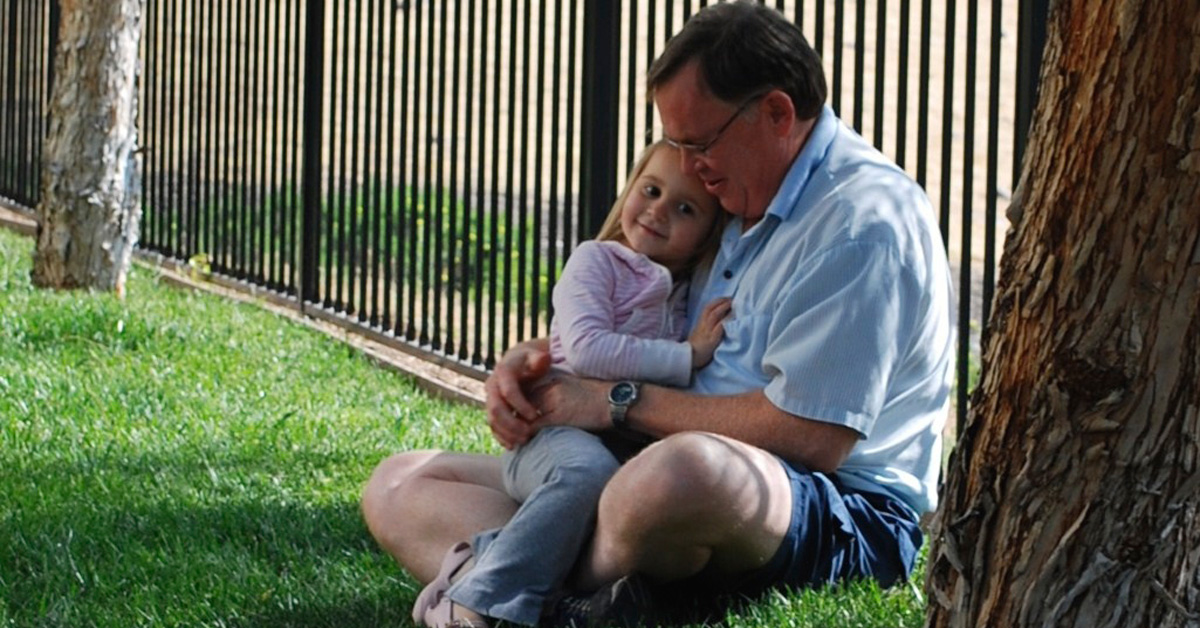I sat with a man recently who has walked with God for over fifty years. I’ve seen him go through amazing adventures with God, help countless others find faith in the storms of life, and stay true to him in times of great suffering.
But a medical emergency threatened all of that. He looked at me with pain-filled eyes, “God has completely forsaken me. He no longer speaks to me. Nothing he said has come true.” How could this man, of all the men I’ve known, fall into such despair and hopelessness? Because he felt he had a promise from God that such a tragedy would never befall him. When it did, he had no place to center his heart.
Expectations.
Nothing will devour our trust in God faster than expecting him to do what we want him to do or even what we think love would require him to do when we hurt.
And yet, the Scriptures are full of encouragement that God works through all kinds of suffering. He hasn’t promised to fix all our pain or make life convenient. That’s the danger of reading the Bible like a promise box, pulling out our preferred passages, and expecting God to do what we want.
What happens when he doesn’t do what we expect? He’s not our fairy godmother, you know, turning our rats into horses, our rags into princess dresses, or our pumpkins into chariots. This world can turn cruel in an instant, and our faith in God does not mean we are immune from the consequences of living in a broken world. Many saints have been shipwrecked on disappointed expectations about how God should work instead of tuning in to how he is.
As Jesus demonstrated on the cross, it is human to be so overwhelmed by despair and disappointment that we feel abandoned by God. He thought God had forsaken him, too, but he hadn’t. God was still there holding him when Jesus could no longer see it. At such moments it is easy to default to the belief that God isn’t there, or if he is, he doesn’t care about me. Then, we can turn on ourselves, thinking we’ve not done enough or aren’t loveable enough for God to intervene on our behalf.
None of those options are helpful roads to go down. He didn’t promise to prevent trouble from coming to our door; he promised that we’d never be alone in it and that he would make a way through it for his higher purpose.
When overwhelming pain finds me on this journey, I no longer default to questioning his love. I used to all the time. I’d rail at God for not being faithful to his promises or his love. Doing so wore me out and never brought me closer to recognizing him with me. He still was, though, and I could look back years later and see how. Now when trouble hits, I stake my confidence on the fact that his love is the only constant in the universe. I may not be able to see how he loves me at the moment, but I choose to set my heart on the reality that he does.
I’ve seen people go through the darkest of circumstances and stay faithful to God’s love in it. Yes, they had questions. Yes, they struggled to hold on to that hope, but I’ve never seen that hope disappointed. God is always with us, even in the dark. It may take years to see, as we look back on how God worked through our trials. This is why our trust in his character has to be stronger than our confidence in the assumptions we make about him abandoning us.
Paul even talked about his own “despairing of life” in some horrible circumstance (2 Corinthians 1), but he knew God would comfort him in it, and the overflow of that would be to comfort others in dire need as well. Perhaps that is what’s most valuable about fellowship—being able to encourage the broken heart, to keep leaning into the reality of his love.
For those of you listening to the new add-on episodes to My Friend Luis, Terror in the Mountains is a case in point. That night, overwhelmed by his dad’s heart attack, exhausted by trying to help him, alone in the dark, and besieged by coyotes, he screamed desperate prayers to a God he wasn’t sure even existed. He wanted God to heal his father, to save him from the coyotes, and to eliminate the fear taking over his mind. God was working in other ways for greater purposes.
Even though God speaks to his heart throughout the night and keeps him from killing himself to end the pain, Luis couldn’t see that until years later. He felt completely abandoned on the worst night of his life. Why didn’t God intervene in a more obvious way? I’m sure I’m not qualified to answer that question. I do know this; Luis looks back now and knows with certainty that God saved his life that night and provided what he needed to triumph over the most unimaginable tragedy. That is now bringing hope to thousands all over the world.
Every week, I talk to people giving up on God’s love because their pain is unbearable or because God doesn’t deliver them from it the way they think he should. They expect him to take away the suffering and forgot to find him inside of it. He promised us a “fellowship of his suffering” as palpable as the “joy of his resurrection.” (Philippians 3) Even Jesus dealt with overwhelming pain inside this broken Creation.
I suspect that’s what we’re all looking for, a connection with him when we are in excruciating pain or circumstances we don’t understand. That’s where trust matters most. It’s hardest to learn that when the pressure is on, so it’s something we might want to contemplate in more relaxed seasons of life.
Cultivate what it means to lean into his love there, then a flood of great waters will not shake you. You’ll be able to find him in your pain and help others to as well.
Because he is always there, at work for our good, even when we can’t see him.









Thanks a lot sir. This is refreshing and invigorating. Yes, He is always there, even when the prevailing situations and circumstances make it look otherwise. Understanding this takes a lot of patience and practice.
Wayne, thanks for being a true voice of faith and reason. So many of us going through reevaluating what we were taught need these words of encouragement.
Pain, humanity’s constant companion should drive us to Jesus but so often drives a wedge. I needed this today. My heart has been breaking over two loved ones and I lost that perspective, so thank you! His mercies are new every morning and I am reminded today of His heart for all of us and that His vision is much longer than ours.
Thank you Wayne. I wonder if this practice is not what Paul spoke about when he said, “Work out your own salvation in fear and trembling .. ” Phil 2
Very well written into a space where this word is sorely needed.
Wayne, Thank you for an excellent, encouraging post. As you know, my challenge has been the various affirmative statements that Jesus and others made in the Scriptures. Such as, “If any two of you agree on anything it shall be done by my Father in Heaven.” “If you abide in me and my words abide in you, you shall ask what you will and it will be done for you.” “A good father won’t give his child a stone if he asks for bread…If you, then, though you are evil, know how to give good gifts to your children, how much more will your Father in heaven give good gifts to those who ask him!”
I do not understand how these things did not apply when I asked Him that my wife to be healed of cancer in this realm. I’m sure there are contextual issues that I don’t get or otherwise.
It comes down to believing He is good and that He loves us, even when we do not understand. Posts like this one help!
Love your last paragraph, Mark. That is what we have to know. As far as the Scriptures you mention, I do think many of us interpret them out of context. The entire context of Scripture is the person of Jesus and the kingdom of God, and how we can live in his unfolding reality. We can pick through Scriptures as if they give us permission to get whatever we want or need from God, but they are not meant to be interpreted without a greater trust in God’s purpose and his activity. In other words, they are to help us follow him, not to use to get him to give us what we want. Jesus invites us out of a self-preferring existence, into a love greater than anything else we desire in this life. Someday, this will all make sense, for today we are left with your last paragraph and our growing confidence in his love can take us through the most frightful things until the day comes when the kingdoms of this world becomes the kingdoms of our Christ and of his God.
Wow, thank you for such an amazing response. I will ponder it and hopefully grow from these words which are absolute truth. Thank you!
Talking to my friend Luis yesterday, he share something God had showed him about his night on the mountain with his dying father at 15 years old. He felt like Jesus had spoken to his heart about the beauty of that night. Luis couldn’t imagine what that meant. Beauty? With all the terror he experienced? But Jesus spoke to his heart about all Luis sacrificed to stay with his dad and get the body back to his family. His impression was that human selflessness in a fallen Creation holds great beauty to God.
It makes so much sense to be and something I have never considered. So many Christians want to be protected from suffering. What if we a deeper meaning for suffering, that it gives us an opportunity to display his beauty in the world by whatever we sacrifice in the world’s brokenness? I don’t believe God orchestrates our suffering, but I do think there is meaning inside them few people see or understand.
In your case, Mark, what you gave in love to your wife during her sickness and passing is a gift in the Creation, even though it wasn’t what you wanted. Letting that work in you will may yet pay dividends in other areas where God’s glory yet needs to shine.
I’m just chewing on this over the last 24 hours, but I suspect I’ll be talking a lot more about it in days to come. If Jesus sees beauty in our sacrifice, even with others misunderstand us and even point accusing fingers thinking we deserved our pain, we share in his sufferings. See Isaiah 53 and Philippians 3.
I’ve been going through some brokenness lately and checked in Wayne to see what you were up to. I like the way you described the purpose of our suffering. It is true, and I am learning after feeling like I got the wind knocked out of me, that this present situation is for God to work something out of me and work something else into me for others to come into their own healing. I also like when you talk about us reading the Bible piece meal as if it is a treasure box to soothe our different needs. The word of God is a treasure alright, but to be lived out fully, wholly, with an understanding of living in the reality of God’s love for us. I thank you for opening your heart and yourself to share and guide.